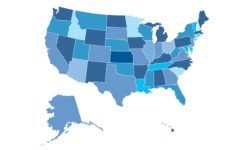Campuses, Regulators Partner to Curb Binge Drinking
LOS ANGELES
In an effort to reduce binge drinking, over consumption and drunk driving, campus safety officers told Campus Safety magazine they’re working closer with alcohol-control officials to implement compliance checks, shoulder-tap enforcement and “cops in shops” patrols.
For Boise State University, the city’s police department has also begun breath testing on game days so tailgaters will know when they’re impaired and should relinquish the keys.
 Prior to a September matchup against Miami of Ohio, the department deployed an RV outfitted with breathalyzer devices that display Blood Alcohol Content to the user who blows into the mouthpiece.
Prior to a September matchup against Miami of Ohio, the department deployed an RV outfitted with breathalyzer devices that display Blood Alcohol Content to the user who blows into the mouthpiece.
“A lot of times, they’re impaired and they don’t know it,” said Officer Jermaine Galloway. “It’s our job to prevent DUIs.”
Galloway maintains a close working relationship with Idaho Alcohol Beverage Control, a division of the state police that issues liquor licenses. These partnerships have become more common, as campus safety officials look for more enforcement leverage to curb binge drinking.
Along California’s central coast, the state Alcohol Beverage Control division’s officials are coordinating with the University of California, Santa Barbara and Cal Poly San Luis Obispo.
There are liquor stores around campus,” said Bill Watton, the University Police chief at Cal Poly. “We do team up with ABC and do undercover [activities] to make sure the establishments are not selling to underage kids.”
Watton has formed a mini task force with the city’s police department and Leslie Pond, district administrator with the ABC’s central coast division.
Campus officers and state alcohol regulators work together to check addresses that register a beer keg, implement shoulder-tap enforcement and share resources with the Sierra Vista Regional Medical Center to help curb sexual assaults. According to Watton, students are often more receptive to the hospital’s ER doctors than campus officers.
“That’s exactly the thing we need to be doing because it does bring all of those entities to bear on an issue such as the alcohol problem,” Watton added. “Even the hospital brings an element, because ER doctors mean more to students.”
Alcohol-control regulators use decoys and undercover “shoulder tap” programs to cite liquor stores and adults who provide alcohol to minors. Pond said the partnership has been effective, so far.
“We work closely with campus police agencies,” Pond said. “They are very proactive.”
If you appreciated this article and want to receive more valuable industry content like this, click here to sign up for our FREE digital newsletters!
 Leading in Turbulent Times: Effective Campus Public Safety Leadership for the 21st Century
Leading in Turbulent Times: Effective Campus Public Safety Leadership for the 21st Century
This new webcast will discuss how campus public safety leaders can effectively incorporate Clery Act, Title IX, customer service, “helicopter” parents, emergency notification, town-gown relationships, brand management, Greek Life, student recruitment, faculty, and more into their roles and develop the necessary skills to successfully lead their departments. Register today to attend this free webcast!







